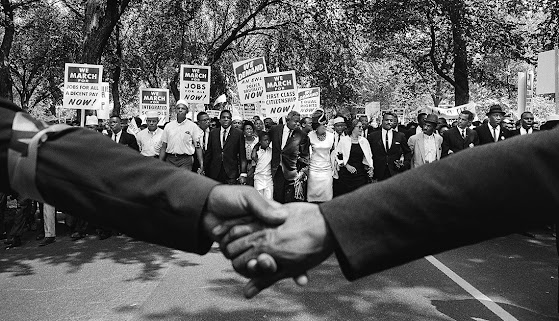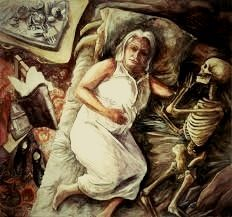Music as Protest in America
An Introduction
In the story, “Don’t Explain” we see small details about the characters’ lives that prove racism is not only found in overt acts of violence against minority groups but can be effectively protested through peaceful means. Letty faces covert acts of racism and discrimination as she juggles the challenges that she is met with. However, the peaceful protest of Billie Holiday's music becomes central to the story and to Letty as we understand the impact that her music had on American society at the time.
Brief Historical Background for Understanding
The story, “Don’t Explain” takes place in Boston in 1959. Although slavery was outlawed after the Civil War, segregation was running rampant in America due to the court ruling that “separate but equal” was acceptable (History.com Writers). However, black Americans were not granted the equal treatment and access to resources as their white counterparts. Most African Americans worked low-wage jobs that were labor intensive and extremely low paying. In addition to economic discrimination, African Americans were targeted and killed for their skin color by white Americans through lynching. Lynching is “...an act of terror meant to spread fear among blacks, served the broad social purpose of maintaining white supremacy in the economic, social and political spheres” (PBS). White Americans dominated the spaces they were in by establishing their often violent means of control over their black neighbors. Although there were countless acts of violence against African Americans, racism was still prevalent in more subtle and deeply ingrained ways in society.
Letty and the Diner
In the story, the main character, Letty, works as a waitress for a white owner of the diner. She and the other waitresses are under people who hold different amounts of power over them due to their job and their race. Tip is a black customer who works as a pimp, and as a result, he tries to talk the girls at the diner into working for him. As the girls discuss Tip, Delia tells Letty, “‘Yeah. He asked if he could take me home after I get off. I told him me and you had something to do’” (Gomez 355). Instead of saying no and being respected by Tip, the girls are forced to weave their way out of his offers through passive and respectful means. In their places of work, “...Black women often faced sexual harassment” (New York Historical Society). Although the interactions with Tip are not violent in the story, the black women being treated as if they are objects acts to point out the unfairness of treatment that they receive. Even though Tip is also black, he does not respect anyone who he thinks is beneath him, and African American women had the lowest social standing at the time. Letty immediately stands and goes back to work when the white owner of the diner, Aristotle, makes an appearance. She explains, “ No matter that it was her break: she knew white people didn’t like to see their employees sitting down, especially with their shoes off’ (Gomez 356). It was not uncommon for a white owner to employ African Americans at his business. If they did so, it made it easier to underpay and overwork the black employees because of their lack of power and ability to find alternative jobs. The New York Historical Society explains that “White employers took advantage of their Black workers by paying them poorly and treating them harshly”. Even though Aristotle does not come off as aggressive, we can assume that the girls who work for him are not being paid in equal amounts to the amount of work they are expected to put in. Institutionalized racism has trapped the girls at the diner and forced them to deal with unfair treatment from those who enter.
Billie Holliday and Peaceful Protests
Billie Holiday was an American jazz singer who became the focus of controversy as her song, “Strange Fruits” was created and popularized. Her passion for activism was the result of discrimination she experienced and saw while growing up as a black woman in the mid-20th century. Her childhood was filled with violence and trauma that started as she watched “...her father’s death [happen] when he was denied medical treatment because of racial prejudice” (Gray). Soon after, she would be moved from school to school while then becoming a victim of sex trafficking as a child (Gray). As she progressed in her career, she faced racial discrimination and watched as those around her were victims of the same prejudice or the lynching that was common in America. Billie Holiday soon realized the power that words and her singing could have on society, and she began to sing the powerful yet controversial song that acted as a form of peaceful protest to the violence directed at African Americans at the time. The song highlights the violence in the lynchings across America and “...became known as a powerful protest anthem that irked the conservative US government…” (Fields). Many black Americans felt connected to Holiday’s music, as seen through Letty’s infatuation with her in our story. As Letty listened to Holiday’s music, “She felt silly when she thought about it, but the melody gripped her like a solid presence. It was more than the music. Billie was her hero” (Gomez 357). Holiday served as a person to look up to, and to Letty she is a strong and admirable person to whom she can connect to. Millions of people idolize Billie Holiday as Letty does, and it shows how impactful peaceful acts of rebellion can be.
Closing Statements
Violence and discrimination towards people of color were extremely common in America during the 1950s. We can see the aggression in acts of violence such as lynching and denial of medical treatment, but racism is also present in more subtle ways in society. Letty working as a waitress under a white boss as a woman of color made her susceptible to small aggressions from customers and unfair workplace treatment. She is able to find power and connection through the singer, Billie Holiday, as the story progresses. Holiday inspired others and ignited a peaceful form of protest that caught the attention of the federal government. Her music had an undeniable impact on American society, and it is still seen today as one of the most impactful performances of that time.
Works Cited
Fields, Liz. “The Story behind Billie Holiday’s ‘Strange Fruit.’” PBS, Public Broadcasting Service, 4 Nov. 2022, www.pbs.org/wnet/americanmasters/the-story-behind-billie-holidays-strange-fruit/17738/.
Gray, Ernestine Steward. “Human Rights Hero: Billie Holiday.” American Bar, 12 Oct. 2021, www.americanbar.org/groups/crsj/publications/human_rights_magazine_home/empowering-youth-at-risk/human-rights-hero/.
Gomez, Jewelle. “Don't Explain.” Using Critical Theory, The Forum Magazine, 1930, pp. 355-357.
Hammond, Harry. Billie Holiday (1915-59), singer, at her only ever London appearance at the Albert Hall, with the Jack Parnell band, photo Harry Hammond (1920-2009). Black and white photography. UK, 1954. 1954. Vandaimages, https://www.vandaimages.com/2006BB0355-Billie-Holiday-at-her-only-ever-London-appearance.html. Accessed 19 Mar. 2024.
History.com Writers. “Civil Rights Movement: Timeline, Key Events & Leaders.” History.Com, A&E Television Networks, 22 Jan. 2024, www.history.com/topics/black-history/civil-rights-movement.
PBS. “Lynching in America.” PBS, Public Broadcasting Service, www.pbs.org/wgbh/americanexperience/features/emmett-lynching-america/. Accessed 17 Mar. 2024.
Schapiro, Steve. The front line of demonstrators during the March on Washington for Jobs and Freedom, Washington D.C. 28 Aug. 1963. AARP.Com, GETTY IMAGES, https://www.aarp.org/politics-society/history/info-2018/civil-rights-events-fd.html. Accessed 19 Mar. 2024.
Tyson, Lois. Using Critical Theory. Available from: VitalSource Bookshelf, (3rd Edition). Taylor & Francis, 2020.




I found this to being an interesting topic to look at and the layout made it easy to find specific information.
ReplyDeleteThe way you brought in historical context on Billie Holiday was amazing support for your argument. I also really liked how you split your blog up into important sections.
ReplyDeleteGreat job on this! I found to very easy to navigate and read your blog, which was very helpful. The quotes and points that you brought up were relevant to your thesis, as well
ReplyDeleteYou delve into the violence and discrimination against people of color in the United States in the 1950s. I loved your explanation of how Billy Holetti's music became a symbol of peaceful protest and inspired countless people.
ReplyDelete